By Alice Corble and Rhiann Tester
This overdue blog post features a guest contributor, Rhiann Tester, Assistant Library Administrator at Sussex. I’ll briefly introduce the context of our collaboration before handing over to Rhiann. Future blog posts will build on Rhiann’s reflections via the content unearthed in the records they helped to preserve.
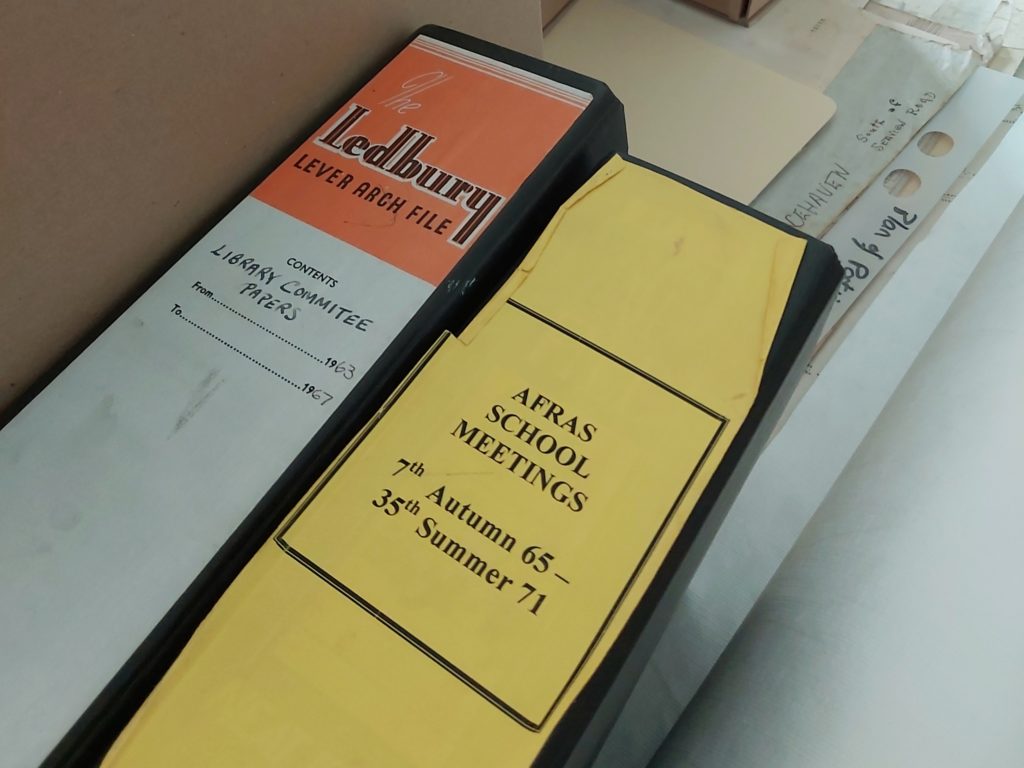
Back in August and September when I was approaching the end of my AHRC-RLUK Professional Practice Fellowship, I was glad to benefit from the assistance of Rhiann in listing some uncatalogued archival records relating to the early administrative history of both the Library and the School of African and Asian Studies (AFRAS) at Sussex. The historic library files had serendipitously surfaced as the Library management and administration teams were undergoing an office move (part of the current Library refurbishment plans), and old filing cabinets in the PA to the Librarian’s office were being cleared out. With a keen eye for detail, Rhiann had identified their relevance to my research project. These records were largely minutes of meetings from the Library Committee, a central committee of librarians and faculty established to develop the research, teaching and learning agenda and resources for the university. This later became re-structured and re-named as The Library Consultative Group, still in operation today.
Around the same time last summer, I’d been in dialogue with Professor JoAnn McGregor about the history of AFRAS, as she had until recently been the director of the Sussex Africa Centre, which along with the Sussex Asia Centre and Middle East and North Africa Centre had sought to re-cultivate interdisciplinary regional research clusters within a global imaginary. AFRAS had closed in the early 2000s as part of a major restructure, but the founding of the current School of Global Studies around a decade later provided a new framework for regional centres. Sadly the Sussex Africa Centre has also recently closed after Black faculty and PhD students involved with the Centre left Sussex, and the MA Africa and Development was suspended. JoAnn had for many years been safeguarding one of the AFRAS administrative archival files which were found in one of the school offices.
Knowing of my embedded research project at the Library, JoAnn passed these files on to me to be accessioned in the University of Sussex Collection at The Keep. These records were largely minutes of various AFRAS committee meetings and associated reports, many of which included librarian input. They demonstrate the symbiotic nature of the relationship between the Library and AFRAS, which must have been the case for the other interdisciplinary schools. But AFRAS required quite particular liaison with librarians to develop the teaching and research collections in line with emerging fields of knowledge and culture in African and Asian countries undergoing decolonisation and seeking to transform and develop institutions after independence.
AFRAS required quite particular liaison with librarians to develop the teaching and research collections in line with emerging fields of knowledge and culture in African and Asian countries undergoing decolonisation and seeking to transform and develop institutions after independence.
Librarians listed in the AFRAS school meeting minutes include Mike Rogers (who later went on to become IDS librarian) and Tehmtan Framroze, who migrated from revolutionary Zanzibar in the mid-1960s to train as a librarian at UCL and took up his first professional role at University of Sussex where he stayed for several decades (and later became Mayor of Brighton – more on him in future posts).
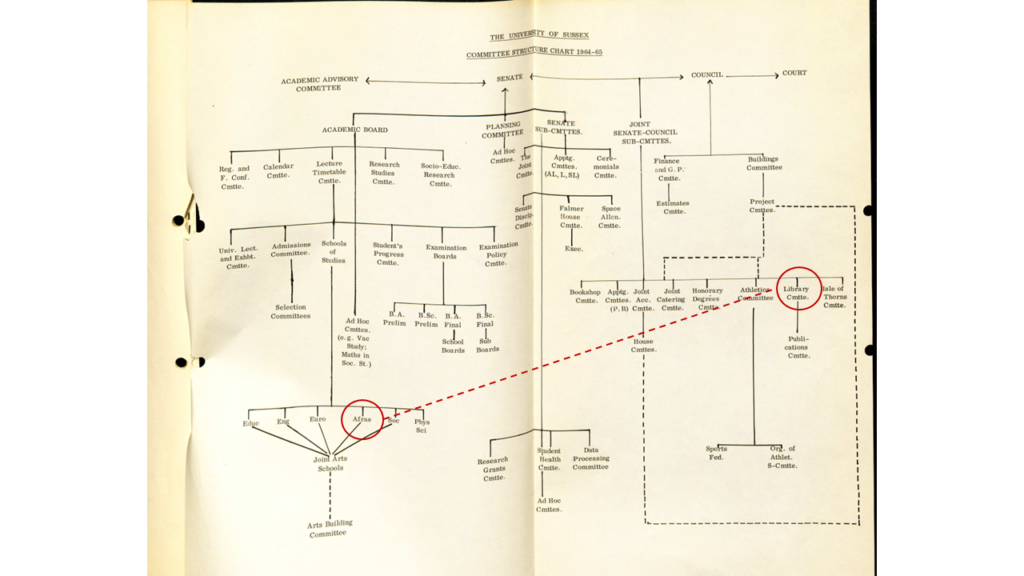
The first stage of any archival accessioning before it can be formally catalogued is to make a comprehensive list of the basic details of each item being deposited and checking for duplicates in the existing collection. This is a time-consuming task and it was a great help to both the Sussex Archivist Karen Watson and myself to have Rhiann’s assistance in this, whose administrative skills and attuned historical sensibility were an asset to this teamwork. And as Rhiann identifies in their reflections on this experience below, the opportunity offered them an interesting window on different but intersecting aspects of library and intellectual history and administrative operations. The Library and AFRAS archival records were in separate offices and only coincidentally came to light at a similar moment this summer, yet elements of their contents speak directly to each other and demonstrate the centrality of the library to academic development.
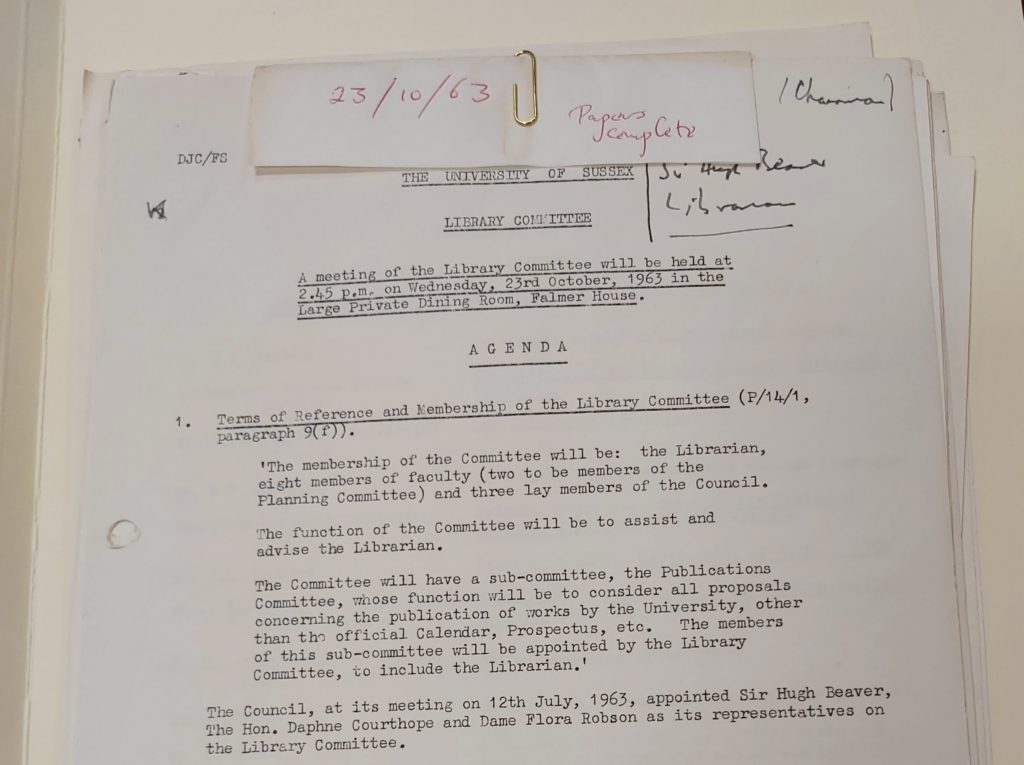
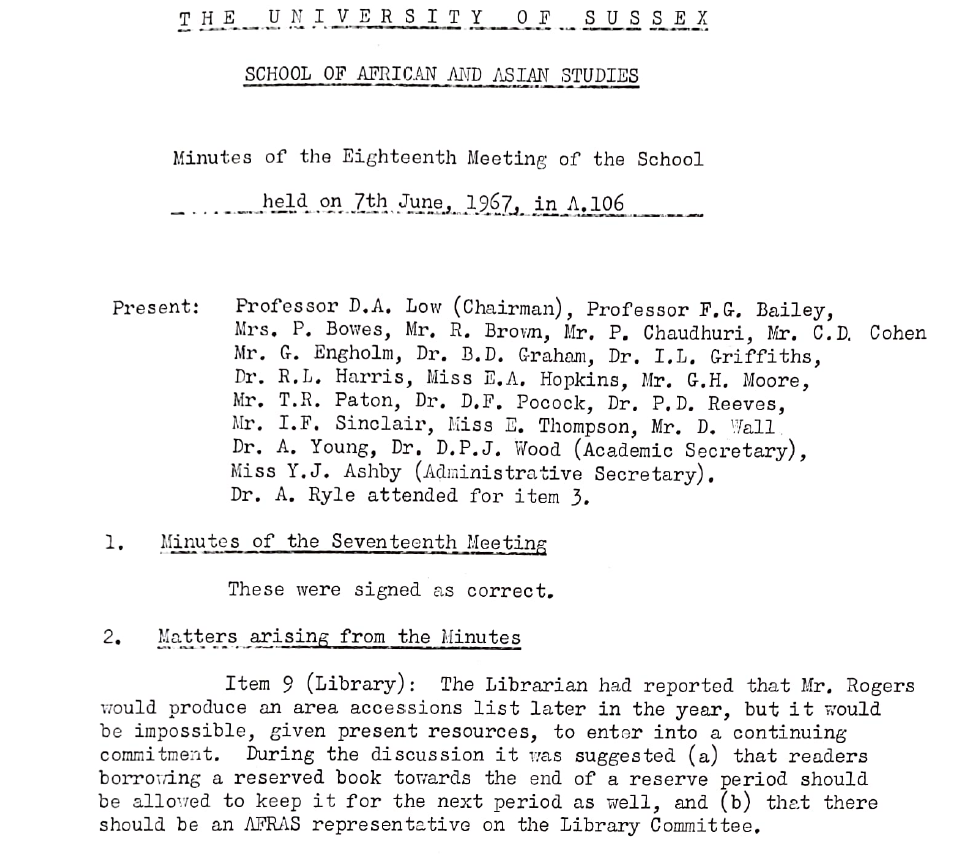
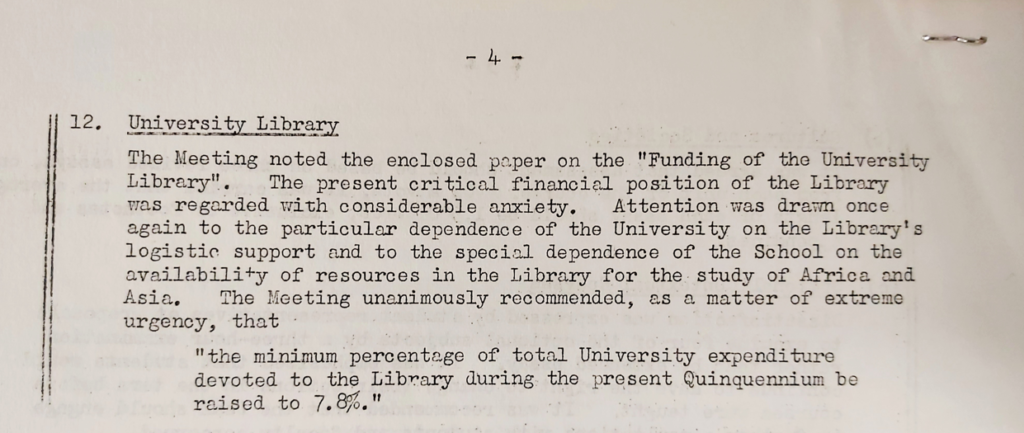
I invited Rhiann to share their reflections on doing this piece of collaborative work, and how it might have influenced possible directions in their own library professional development. Over to Rhiann.
Guest post by Rhiann Tester
I’m very interested in two things: history and systems. And what is an organization but a very large, often unwieldy system? I’ve worked for two very large institutions now, the University and East Sussex County Council (and worked in two very 60s buildings!) and it fascinates me how institutional memory develops and changes.
I’ve been fascinated by Alice’s decolonislation project since I found out about it and so when the Librarian’s PA showed me the documents that had been stored in her office I just knew who to tell about them, especially once I saw a piece of paper with the handwritten note “it was suggested that there be a AFRAS representative at the Library Committee”.
I was very excited when I was asked to help catalogue the files. It ended up being not too different from my day-to-day work, in that as an admin at least half of my work boils down to taking information, sorting through it, and putting it into a more useable or searchable format. It’s just normally overtime forms instead of meeting minutes from the 1970s.
It was interesting to see the connections form between the AFRAS papers, the Library papers and beyond. The first time I saw the Centre for Multi Racial Studies mentioned was a particularly exciting moment. The lists of book donations in the Library Committee group papers was perhaps my favourite series of documents. As a user of the Library, I’d noticed that many editions we hold are sometimes significantly older than the Library itself, meaning that the books must have had a past life. Many academics donated books and journals, including Professor Fernando Henriques. A number of Local Authorities also donated books, as did institutions. Two which stood out to me were SOAS and the Rhodes House Library. Many books also came to us through the connections of Lady Reading, who was an early supporter of the University. Therefore, before the Library even existed we have the biases and perspectives of other institutions and individuals as an integral part of our collections.
As a user of the Library, I’d noticed that many editions we hold are sometimes significantly older than the Library itself, meaning that the books must have had a past life. Many academics donated books and journals, including Professor Fernando Henriques. A number of Local Authorities also donated books, as did institutions. Two which stood out to me were SOAS and the Rhodes House Library. Many books also came to us through the connections of Lady Reading, who was an early supporter of the University. Therefore, before the Library even existed we have the biases and perspectives of other institutions and individuals as an integral part of our collections.
I found learning about the discussions that were being held, especially at the beginning of the Library’s history very interesting. Some of them we’re still having, like the heating of the building and reclassification, and some are very much problems of the past. I also felt I gained a greater understanding of the history of Britain in general. No matter how many times my mum’s told me about the difficulties of the 1970s and ’80s, seeing the cuts that were made to library services through that period, and the reasons why, helped me think about it in a way that was more real. Maybe that’s because I can directly relate it to the Library as it stands today?
I think I have definitely benefited from working at the Keep and getting to interact, even a little bit, with the day-to-day work of Special Collections and the other teams based there. Even just sitting in the kitchen and talking to various people about the work they were doing helped me understand more about their roles. It’s definitely reinforced to me how important archives and proper record keeping and archival process are. One of the things that struck me was that the AFRAS papers that we have are what remains of a larger archive that was lost around the time the school was closed.
I don’t know if I’d like to work in an archive but I know that could be a path for me now. Some things can seem very closed off when you come from a background where no-one in your family has worked in this kind of field before. Simply knowing the possibilities, that the work I was doing is actually part of someone’s job, helps with that.


[…] from the Decolonial Maps of Library Learning […]